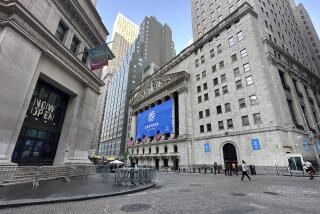Recession Is Official, Research Panel Declares
- Share via
WASHINGTON — Amid a flurry of conflicting signals, the arbiter of the nation’s economic performance declared Monday that America’s longest-running period of growth gave way in March to the first recession in a decade.
The news from the National Bureau of Economic Research’s business-cycle dating committee hardly came as a surprise. But it caught many Americans behaving as if the economy had never missed a beat--and many economists predicting that the recession would be short and mild.
Stock and bond markets have recently staged impressive rebounds. Unemployment benefit claims appear to have leveled off. American consumers have kept on buying.
But the decision by the committee, a private group long regarded as the official arbiter of when expansions and contractions begin and end, signals that the economy’s troubles have grown so extensive that they now touch virtually all corners of the country, and have been exacerbated by the Sept. 11 terrorist attacks.
“Before the attacks, it is possible that the decline in the economy would have been too mild to qualify as a recession,” the panel said in its statement. “The attacks clearly deepened the contraction and may have been an important factor in turning the episode into a recession.”
Employment, which the committee regards as a key economic measure, plummeted in the wake of the suicide airliner assaults as firms slashed payrolls by 415,000 in October, the largest one-month loss of jobs in more than two decades. Industrial output fell for a 13th consecutive time last month, the longest string of declines since the Great Depression.
But even amid such signs of economic weakness, many forecasters and analysts say they see the early indications of recovery.
New-home construction is likely to reach 1.6 million units this year, topping its strong showing in 2000 and coming close to the 15-year high it achieved in 1999. Car and truck sales rocketed a record 26.4% in October after auto makers slashed prices and offered no-interest financing.
Thanksgiving weekend retail sales, which often are taken as an early sign of how the critical holiday sales season will go, were up a better-than-expected 2.4% over last year, according to TeleCheck Services Inc. Wal-Mart, the nation’s biggest discount chain, said that its post-Thanksgiving Friday sales alone hit a record $1.25 billion.
Analysts said that, somewhat paradoxically, the panel’s recession decision may contribute to predictions of an early recovery. By declaring that the recession started in the spring, the group has in effect said a substantial portion of contraction is already over.
“The typical postwar recession has been three or four quarters long,” UCLA economist Edward E. Leamer said. “If this one started in March, then we’re more than halfway through without anyone feeling any serious pain.”
The committee noted that, in contrast to past recessions, one of the four major measures used to determine whether the economy is contracting--real personal income--has continued to grow. Panel members said the trend suggests consumers may be able to keep the economy afloat by continuing to buy. “I think personal income will prove to be much more robust than expected,” said Martin Feldstein, the research group’s president and a panel member.
In addition, committee members said Washington has used its economic management tools of tax and spending changes and interest rate cuts more effectively this year than during the early stages of other recent recessions.
“Fiscal and monetary policy have been unconstrained [by budget deficits and inflation] and have been put to considerable use,” said Jeffrey Frankel, a Harvard economist and panel member.
The panel’s decision that the country is in recession comes at a time when Congress is at loggerheads over legislation to stimulate the economy.
Lawmakers return Tuesday from a weeklong Thanksgiving recess amid serious questions about whether they can bridge differences between the parties and settle on a measure. Republicans want legislation that is heavy on tax cuts for businesses and individuals; Democrats want more spending for aid to unemployed workers and for projects to shore up domestic security.
Neither side has shown much willingness to compromise in the days since the bill stalled in the Senate this month. Some hoped that the official declaration of a recession would increase pressure on both sides to compromise, but the immediate reaction to the panel’s decision suggested that it is unlikely to serve that purpose.
Asked about the panel’s decision, President Bush said it demonstrated the need for the Senate to act quickly on the administration’s stimulus proposal. “I am obviously aware that our economy is slow,” Bush said. “We will do everything we can to enhance recovery.”
Senate Majority Leader Tom Daschle (D-S.D.) just as adamantly said the White House and Senate Republicans should move toward the Democratic stand. “Economists have begun saying the nation is in recession. Now is not the time to play politics with our economy and security,” he said.
A recession traditionally is defined as two consecutive quarters of decline in the nation’s gross domestic product, a measure of the total value of goods and services produced in the U.S.
But the research group’s panel uses a different standard, defining a recession as “a significant decline in activity spread across the economy, lasting for more than a few months, visible in industrial production, employment, real income and wholesale-retail trade.” The panel does not rely on GDP because it is a quarterly rather than a monthly measure and is often revised.
*
Times staff writers James Gerstenzang and Janet Hook contributed to this report.
More to Read
Inside the business of entertainment
The Wide Shot brings you news, analysis and insights on everything from streaming wars to production — and what it all means for the future.
You may occasionally receive promotional content from the Los Angeles Times.










